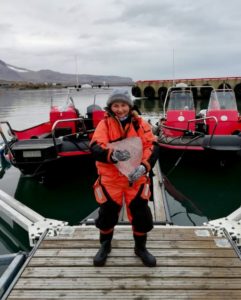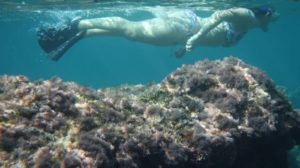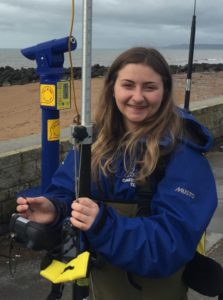Jenny Watts is a PhD Researcher at the University of Exeter and Plymouth Marine Laboratory. Her research focuses on developing novel remote sensing techniques using drones and satellites to improve our understanding of the impact of sea ice on air-sea exchange of carbon-dioxide in the polar oceans. This is Jenny’s blog on conducting research in the face of the climate emergency.
The first year of my PhD has occurred against a backdrop of climate emergency declarations, climate protests and climate strikes. As a researcher in this field it has been amazing to see so many people want to effect real change. At the same time this has led to an increase in climate anxiety, caused in part by a feeling of hopelessness as an individual to make a difference. This is exactly how I feel.
I’ve been told the best way to combat climate anxiety is to feel like you’re at least ‘doing something’ to try and tackle it. This can mean reducing flying, eating less meat, lobbying your local MP on green issues or switching to green energy suppliers. Some of these are more difficult to implement than others but they are all actions I can take in my personal life – but what about my PhD research?
I have to say that my mind-set during the first year of my PhD has definitely changed. I have become increasingly aware that my actions as a researcher are not without an impact on the environment. While I know some researchers can justify their (often large) carbon footprints as being ‘for the greater good’ I am becoming increasingly less comfortable with this justification. It has become important for me to feel I am trying my best to align my actions as a researcher with my beliefs – to try and set the best example I can, but this is not without challenges.

On Svalbard in the Arctic Circle, holding an iceberg.
Implementing the same steps within my PhD that I can take in my personal life has at times felt difficult. For example, travel is a major component of the carbon budget of a research project, including getting to fieldwork sites, conferences, meetings and courses. The expectation that you undertake these activities is there, and as someone early in their career looking to make important connections it can be very difficult to differentiate between what opportunities can be missed and what needs to be attended. University wide guidance for early career researchers wishing to reduce their carbon footprint remains limited. Individual choices often come down to a supervisor’s stance on the topic (Shout out to my supervisor for being particularly on it in this case).
It’s not all doom and gloom though! If you are looking to reduce your footprint where possible there are actions you can take, including:
- Travelling by train where possible (try https://www.seat61.com/ or https://raileurope.co.uk/)
- Using a carbon footprint calculator to become aware of your impact and aid decision making https://www.carbonfootprint.com/calculator.aspx
- Looking for opportunities closer to home – is there a similar conference in Europe instead of further afield?
- Attending events remotely where possible
- If flying is unavoidable what else can you do to give the trip value? For example is there anyone else you can meet with? can you add a holiday on? (I can highly recommend the latter)

Snorkelling in the Mediterranean near Crete during a pre-course holiday
It’s also important to remember there will likely be things you have to do which have a high carbon footprint (for example I have to get to the Arctic/Antarctica at some point, I don’t plan to swim there…). There are also opportunities you should take – for example if the one great conference for your subject is in New Zealand and you have an opportunity to present your research you can’t spend the whole time feeling bad about going. For me it’s all about balance, and while trying to find this can sometimes feel difficult and overwhelming I think we are starting to take steps in the right direction.
Written by: Jennifer Watts
@polarseasjen

